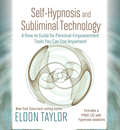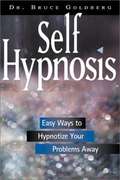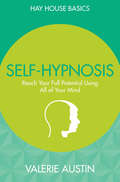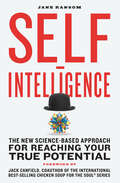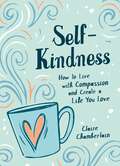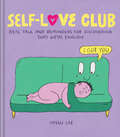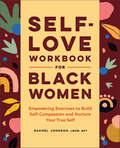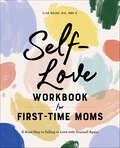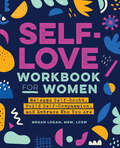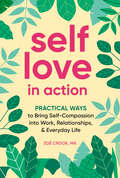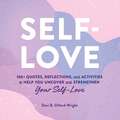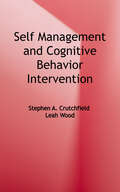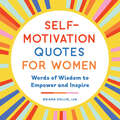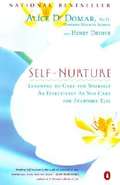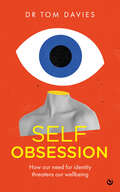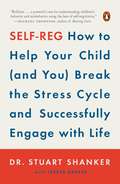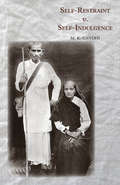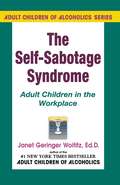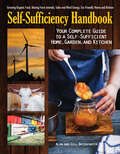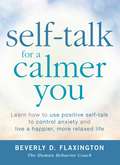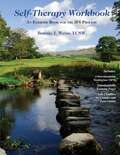- Table View
- List View
Self-Hypnosis and Subliminal Technology: A How-to Guide For Personal-empowerment Tools You Can Use Anywhere!
by Eldon TaylorEverybody has some character trait he or she would like to change, and there are many techniques available to facilitate these changes. Unfortunately, many of them are either impractical or expensive—or both!Most people are somewhat familiar with hypnosis and subliminal technology but are reluctant to use them as serious self-help tools. In large part this is due to the fact that they’ve been mired in mystique, urban legend, and disinformation. The truth is that both self-hypnosis and subliminal communication are backed by extensive research that demonstrates their efficacy. More important, once learned, they can be customized for any situation and used almost anytime and anywhere.Join Eldon Taylor on your own self-improvement exploration using the tools in this book and on the accompanying audio download. Experience hypnosis and subliminal patterning for yourself!
Self-Hypnosis: Easy Ways to Hypnotize Your Problems Away
by Bruce GoldbergHere is a revolutionary approach to coping with habits| Phobias' chronic pain, and other issues using easy-to-use techniques of self-hypnosis. The effect of techniques presented within, like making self-hypnosis tapes to reprogram the subconscious, is to put the "self" back in self-help and eliminate the many dependencies and co-dependencies that complicate and take the joy out of life. Both theory and scripts are presented in this book to help you reach your goals and give you viable solutions for: Increasing self-confidence. Weight reduction. Quitting smoking. Relieving chronic pain. Dealing with phobias and fears. Improving concentration and memory. Slowing down and even reversing the aging process. Enhancing creativity. Sexual dysfunction. By devoting a mere 20 minutes each day to this approach, you can literally take charge of your life. Hypnotic suggestions are effective because they bypass the conscious mind's natural resistance to change and to reprogram the "computer" we call the subconscious to permanently effect these changes. Self-Hypnosis is a compelling book that will change the way you view your life. This is a must-read for anyone interested in exploring self-awareness and taking control of his or her destiny.
Self-Hypnosis: Reach Your Full Potential Using All of Your Mind
by Valerie AustinThis book will give you the skills to train yourself into deep hypnotic trances, ridding yourself of negative thoughts and behaviors, and improving any aspects of your life you want to change. Discover: •easy to follow, step-by-step techniques that you can use to hypnotize yourself •practical exercises to help you deepen your trance •how hypnosis can help you stop smoking, eliminate phobias, reduce weight, sleep better – and more! •how hypnosis can help when you have a major illness.Hay House Basics is a new series that features world-class experts sharing their knowledge on the topics that matter most for improving your life. If you want to learn a new skill that will enhance your wellbeing, Hay House Basics guarantees practical, targeted wisdom that will give you results!
Self-Intelligence: The New Science-Based Approach for Reaching Your True Potential
by Jane Ransom“Count yourself lucky to have found this book. It contains some of the most fascinating information and material you will ever read.” —Jack Canfield, New York Times–bestselling author of The Success PrinciplesSelf-Intelligence is the self-help book for people who long to transform their lives and who trust only proven scientific tools, but also prefer page-turners to dry prose.Cutting-edge brain science meets superb storytelling as readers learn proven techniques to break through inner gridlock, sustain high performance, and achieve their dreams. All of this is possible due to neuroplasticity, the revolutionary discovery that we can literally re-form our brains by strategically choosing our thoughts, actions, and experiences.First came emotional intelligence, then came social intelligence. Here, at last, Self-Intelligence provides the big picture, incorporating the latest research from diverse scientific fields. Mental coach and transformational trainer Jane Ransom lays out for you the new Self-Intelligence™ model, which she has used to help countless clients achieve the positive change they previously found impossible.You’ll be uplifted, motivated to move forward, and simply fascinated. The author, who also is a master hypnotist, devotes a riveting chapter to the art and science of hypnosis. Throughout the book, she shares intriguing behind-the-curtain glimpses of its applications.By following the easy, clear precepts of Self-Intelligence, you can finally achieve your true potential and take the scientific short-cuts to greater success. You’ll be empowered to avert old obstacles and achieve tangible goals.“Entertaining and erudite, Self-Intelligence busts self-help myths while providing scientific tools to help ordinary people achieve extraordinary results.” —John J. Ratey, MD, Harvard Medical School professor and author of A User’s Guide to the Brain
Self-Kindness: How to Live with Compassion and Create a Life You Love
by Claire ChamberlainTransform your relationship with yourself! This is the ultimate guide to embracing self-love and living a life with more self-compassionWe all know the value of treating other people with kindness – so why do we often forget to extend the same courtesy to ourselves?Learn a radical new approach to self-love with this beautiful handbook. Through a combination of practical tips and actionable advice, Self-Kindness will help you to deepen your self-love and grow your happiness.You will learn how to:Find peace within yourself and nurture a more positive mindsetLook after your mind and body to develop greater self-confidenceEnrich your overall health and well-being with diet and exerciseTap into the uplifting power of affirmationsWhether you’re at the beginning of your journey to self-acceptance, or you’re a seasoned self-love advocate, let this guide celebrate and support you as you continue on the path to self-kindness, joy and well-being.
Self-Love Club: Real Talk and Reminders for Discovering that We're Enough
by Hyesu LeeThis celebration of self‑love and healing, from illustrator and comics creator Hyesu Lee, is a knowing smile and a shared sigh in book form. Welcome to the club!Finding the uniqueness that makes you you. Empowering yourself while staying vulnerable and open. Learning to rest, nurture your needs, and embrace self-love. Hyesu Lee has been on a healing journey toward all these states, and she invites you to come along with her.In this generously candid compilation of art, comics, and illustrated reflections, Lee shines a humorous and heartfelt light on the small moments in life that help us find ourselves and learn to love what we find. This charming little book makes the perfect gift for that person in your life you'd like to see join the self‑love club, whether that's a friend, a loved one, or your very own self.A POSITIVE APPROACH TO SELF-CARE: This book takes a joyous approach to self-acceptance and is full of reminders that no matter where you are in your journey, you are enough, and you are loved. Its humor and bright colors make it a breath of fresh air, but it's also not afraid to look at the harder things in life. We must love ourselves in good times and in bad, and small encouragements like this comic gem are just what we need to help us do so. RISING-STAR ARTIST: Hyesu Lee's work as a muralist, illustrator, and cartoonist inspires her fans with its unique take on life. Born and raised in Seoul, South Korea, she is now based in Brooklyn and has gained a loyal following for her idiosyncratic style found in illustrations for brands, magazines, public murals, and packaging worldwide.CONTENT-RICH GIFT BOOK: While this book is petite and sweetly sized for gifting, it's chock-full of words of wisdom and clever reflections to peruse over and over. This is a book to spend time with or to keep at the bedside whenever you need to feel seen.Perfect for:Anyone who could use a boost to their mental health and own sense of self-loveGiving as girlfriend gifts, gifts of encouragement, or Valentine's Day giftsFans of Hyesu LeeIllustration buffsReaders of comics and graphic novels from artists like Allie Brosh, Abbi Jacobson, Reza Farazmand, and Ton Mak
Self-Love Workbook for Black Women: Empowering Exercises to Build Self-Compassion and Nurture Your True Self (Self-Love Workbook and Journal)
by Rachel JohnsonShow yourself a little TLC with self-love exercises for Black women As a Black woman, the many roles you fill can leave little room to take care of yourself. Prioritize your own joy, healing, and growth with this self-care workbook for Black women, filled with empowering exercises and affirmations that help you nurture your authentic self and thrive.Embrace self-love—Lay the foundation for self-love as you reflect on your identity, explore experiences many modern Black women share, and learn what loving yourself truly means.Put it into practice—Discover writing prompts, affirmations, and other simple exercises that help you find inner peace and self-confidence.Explore key themes—Learn to love where you're at, practice self-compassion, let go of self-doubt, foster your self-worth, and build a community that empowers you.Give yourself the gift of self-compassion with this uplifting choice in self-care books for Black women.
Self-Love Workbook for First-Time Moms: A Road Map to Falling in Love with Yourself Again
by Elsa RojasMake time for self-love with friendly guidance for new momsMotherhood is as beautiful and rewarding as it is challenging and uncertain. Finding ways to stay confident and positive are key to weathering the ups and downs of raising a child. The Self-Love Workbook for First-Time Moms helps any mom build the habit of taking time for herself with simple but inspiring prompts and exercises she can do every day.Made with moms in mind—Learn how self-love makes it easier to move on from mistakes and be a better role model.Brief enough for busy lives—Find advice that inspires deep reflection on all aspects of life but is broken up into bite-size entries that moms can do whenever they have a moment.Rooted in real psychology—Explore exercises based in positive psychology, mindfulness, and other proven methods for sustaining self-love and approaching new motherhood with confidence.This self-love journal offers gentle support and encouragement for any woman feeling nervous about the adventures of motherhood.
Self-Love Workbook for Women: Release Self-Doubt, Build Self-Compassion, and Embrace Who You Are (Self-Love Workbook and Journal)
by Megan Logan MSW, LCSWDiscover how much there is to love about yourself with this bestselling workbook. And then keep your journey going with the official companion: the Self-Love Journal for Women.This is the ultimate workbook for women for self love, offering a healing journey of self-discovery. Embrace who you are with this guided self-love book for women of any age and any background. Start by learning what self-love is, and then immerse yourself in activities that help you build your self-esteem and improve your relationships.Looking for a self-esteem workbook that is tailored to the specific challenges faced by women in the modern world? Look no further! This book includes a variety of exercises to engage with your sense of self-love, and the companion journal encourages you to go even deeper with writing and reflection.This self-care book for women includes:Proven techniques—Fall in love with yourself using a variety of compassionate exercises rooted in mindfulness, self-care, and positive psychology.Inspiring activities—This self-esteem workbook features prompts like quizzing yourself on what matters to you, making a happy playlist, and writing a message to your younger self to help you tap into your emotions and let go of limiting beliefs.Empowering affirmations—Nurture yourself with uplifting affirmations interspersed throughout this self-help workbook, and foster a better relationship with yourself and others.Share the self-love—This book makes an amazing gift for yourself—or any woman in your life who deserves to put herself first and explore how awesome she is!If you're looking for healing books based in self-love, get ready to create a life filled with greater purpose and pleasure with the Self-Love Workbook for Women.
Self-Love in Action: Practical Ways to Bring Self-Compassion into Work, Relationships & Everyday Life
by Zoë CrookLearn practical ways to self-nurture, self-express and celebrate your unique path—at home, at work, and out in the world—with this compassionate, everyday guide to self-love.What is self-love? And what do our lives look like when we practice it? Self-Love in Action myth-busts the idea that to care for oneself is selfish, and instead provides actionable tools to put more time, energy, and compassion into everyday activities. (It's okay to take a breath, or five, before that next email.) This practical guide empowers readers to confront the past, examine the present, and transform the future by taking tiny, meaningful steps to reclaim self-appreciation and joie de vivre. Build confidence with small rituals that shift the focus from &“them&” to &“me&”—reminding you that true love flows from the inside, out. Implement &“Time to Practice&” exercises to pause, set boundaries, say &“no,&” and invest in yourself as you deepen your sense of self-worth. Take self-love quizzes to reflect on the ways current habits might impede self-love action. Explore case studies from clients who have overcome common hardships through their commitment to self-love.
Self-Love through the Sacred Feminine: A Guide through the Paintings & Channelings of Jo Jayson
by Jo JaysonJo Jayson's extraordinary paintings and channelings of Sacred Feminine archetypes, prophetesses, and women of strength herald the way to a unique path toward Self-Love. Thirteen Divine feminine energies compelled her to paint their images and share their powerful messages of love and healing. View these beacons of Light through prayers, lessons, and wisdom as each offers you a way to reconnect with your true Divine self. Guided by Spirit, Jo helps us to understand that our souls are our "cups full of Source." Learn to love yourself unconditionally, become empowered, access courage, forgive, embody the Sacred Feminine, and weave the web of your life. Now is the time to identify and use your own magical wisdom and the intentions of your heart, guided by the Sacred Feminine within you.
Self-Love: 100+ Quotes, Reflections, and Activities to Help You Uncover and Strengthen Your Self-Love
by Devi B. Dillard-WrightEmbrace the power of self-love with these 120 calming, thought-provoking reflections designed to boost self-compassion, understanding, and authenticity. Loving yourself isn&’t always easy. There is so much negativity around—criticism, impossibly high standards, perfectionism—it is easy to lose sight of how wonderful you really are. But with a little self-love, you can get back on track. In Self-Love, you&’ll find 120 reflections that will help you cultivate and strengthen self-love. From recognizing the power of your body to forgiving yourself for past mistakes, this simple yet empowering guide will provide the tools to reconstruct how you view yourself. Each reflection comes with a short exercise that will help you actively build self-love and not just view it as an abstract concept. From self-loathing to self-compassion, you deserve to love yourself and celebrate the greatness within. So open your mind, take a few deep breaths, focus on the desire to change and you will learn to love yourself more than you ever have before.
Self-Made: Generate Your Wealth Like a Millionaire! (Self-made Ser.)
by Brian Koslow Dr. Meryl KoslowThe renowned success coach reveals the three fundamental principles for building wealth in this practical and inspirational guide.Making a lot of money is easy—once you know how. This is the reason the rich tend to get richer. When you have this knowledge and put it into action, your financial destiny isn’t simply left to chance. In Self-Made, renowned success coach Brian Koslow teaches you how to make powerful choices that lead to greater profits. You’ll learn how to maintain a “Wealth Mind-Set,” build “Mutually Advantageous Relationships,” and develop “Millionaire Skills.”Presented in an easy-to-read format with summaries, millionaire tips, and exercises, Self-Made is the ultimate study guide for success. By putting Brian’s advice into action, you will increase your effectiveness at creating wealth and finally control your financial destiny!
Self-Management and Cognitive Behavior Interventions
by Stephen A. Crutchfield Leah WoodSelf-Management and Cognitive Behavior Interventions is a guide to using cognitive behavior modification (CBM) with students with autism spectrum disorder (ASD) to increase the student's self-management. CBM approaches include self-management intervention (SMI) and cognitive behavior intervention (CBI). SMI is synonymous with self-regulation and encompasses a variety of cognitive processes, such as controlling emotions, attending to relevant information, planning future behavior, remaining flexible through unplanned setbacks, and behaving in a way that enhances the likelihood of achieving future goals. SMI is managed by the student and is used to address a wide variety of target behaviors. CBI helps individuals examine their thoughts and emotions and adopt actions that change their thinking as well as their behavior. This book examines specific, research-based cognitive behavior interventions and self-management interventions and explores designing and implementing interventions for students with ASD.
Self-Motivation Quotes for Women: Words of Wisdom to Empower and Inspire
by Briana Hollis LSWFind the confidence and inspiration to power through life's ups and downs Self-motivation drives you forward when there's no one else around to give you a push, making it so much easier to overcome daily challenges and achieve your goals. This standout among self-motivation books for women has more than 100 compelling quotes and stories to give you a boost of confidence and empowerment that will carry you through any situation. Words from wise women—Get inspired by thought-provoking insights and life lessons from a wide range of powerful women, including Laverne Cox, Victoria Cruz, and Anne Frank. Meaningful encouragement—Explore anecdotes that will help you get through tough times, own your power as a woman, use your voice, and stay true to yourself. Self-motivate your way—Feel free to read the book from front to back, or flip through and find the message that fits your current situation—there are no rules here! Pick up this top choice in inspirational books for women and get motivated to start living your best life today.
Self-Nurture: Learning to Care for Yourself as Effectively as You Care for Everyone Else
by Alice D. Domar Henry DreherEveryone knows someone who needs this book Think about how you feel at the end of a day when you find your first free moment so late in the evening that you're too exhausted to enjoy it. If you've had too many days like this, find the help you need to transform your life in Self-Nurture. Harvard psychologist Alice D. Domar, Ph. D. , shows you how to restructure your life in a way that lets you breathe. Here are inspiring stories, easy-to-follow exercises, and meditations that will shift your focus from self-sacrifice to self-care. Written with wisdom and humor, Self-Nurture will empower you to develop the same fierce and tender concern for yourself that you've always given to those you love--a gift for anyone who needs to learn the art of self-care. To listen to an interview with Alice Domar, check out www. TalktoTara. com
Self-Obsession: How our need for identity threatens our wellbeing
by Tom DaviesDoctor, writer and mental health advocate Tom Davies breaks down the true problem at the heart of our psychological pain and the growing mental health pandemic, providing effective solutions that anyone can practice to live a more fulfilled and happy life.There is one point that contemporary psychology and centuries old Eastern Buddhist and Taoist teachings agree on: if you wish to experience less suffering, you must change the way you see yourself. But what if the change that is needed is to let go of our selves entirely? What does this mean for those of us living in an increasingly self-obsessed and individualistic society? Is our quest for identity actually sabotaging our own wellbeing?In this compassionate and galvanizing book, Dr Tom Davies gently invites you to consider the basic elements that define who you are.In Part One, get to know your self. From the ground up, discover what the self truly is, how it links to identity, and how self-obsession is central to the human condition and the psychological pain that each of us experience.In Part Two, overcome self-obsession. Free yourself from your psychological prison, and learn how to live the peaceful and joyful life that you deserve.With a fresh and lucid style, Dr Tom Davies combines his knowledge of the medical, psychological and the philosophical to bring you real solutions to life&’s most challenging problems. Whether you are searching for meaning, or are struggling with stress, anxiety, grief or depression, this perspective will provide you with an empowering new insight that can help you transform your life.
Self-Publishing Checklist
by April D Brown<p>Self-publishing feels overwhelming. So many places to start. Multiple options to upload various file types. They don't all match. Several distributors and combinations of distributors and social media blast options. It's difficult to know where to begin. </p><p>Each section of this workbook goes into detail about everything you need before you reach the destination's internet page. Step one covers an indepth look at nine distributors. The cover page for each highlights the major points later broken into individual worksheets. Step two goes into more detail about the pre-launch and post-publishing marketing aspects among several platforms. The Book Listing Newsletter sites picks a few sites to cover. More come and go every day. It gives a general idea of what you need prepared to use them. The last major section covers information about direct sales. This is something some authors look forward to, and others dread. It'll give you a list of points to remember for each one.</p><p>This group of checklists aims to help you organize your plan. Of course, it can't cover every option out there. They are constantly changing. Use these lists as a guide on your publishing and marketing journey. </p><p>Worksheets can be printed and updated for each project, or kept in a binder to refer to on all stages of the process: before, during, and after publication.</p><p>This book includes a link (in the back) to download an Excel spreadsheet full of data to help you connect all of this information into a practical process.</p><p>Step 1: Publishing Distributors</p><p>Amazon</p><p>Apple iBooks</p><p>Barnes and Noble</p><p>Bookshare</p><p>CreateSpace</p><p>Draft2Digital</p><p>Kobo</p><p>Smashwords</p><p>Step 2: Publishing Checklist</p><p>Book Listing Newsletter Sites</p><p>Direct Sales</p><p>Appendixes of printable worksheets</p>
Self-Reg: How to Help Your Child (and You) Break the Stress Cycle and Successfully Engage with Life
by Stuart ShankerThere's no such thing as a bad kid. That's what a lifetime of experience has taught Dr. Stuart Shanker. No matter how difficult, out of control, distracted, or exhausted a child might seem, there's a way forward: self-regulation. Overturning decades of conventional wisdom, this radical new technique allows children and the adults who care for them to regain their composure and peace of mind. Self-Reg is a groundbreaking book that presents an entirely new understanding of your child's emotions and behavior and a practical guide for parents to help their kids engage calmly and successfully in learning and life. Grounded in decades of research and working with children and parents by leading child psychologist Dr. Shanker, Self-Reg realigns the power of the parent-child relationship for positive change. Self-regulation is the nervous system's way of responding to stress. We are seeing a generation of children and teens with excessively high levels of stress, and, as a result, an explosion of emotional, social, learning, behavior, and physical health problems. But few parents recognize the "hidden stressors" that their children are struggling with: physiological as well as social and emotional. An entrenched view of child rearing sees our children as lacking self-control or willpower, but the real basis for these problems lies in excessive stress. Self-regulation can dramatically improve a child's mood, attention, and concentration. It can help children to feel empathy, and to cultivate the sorts of virtues that most parents know are vital for their child's long-term wellbeing. Self-regulation brings about profound and lasting transformation that continues throughout life. Dr. Shanker translates decades of his findings from working with children into practical, prescriptive advice for parents, giving them concrete ways to develop their self-regulation skills and teach their children to do the same and engage successfully with life for optimal learning, social, and emotional growth.From the Hardcover edition.
Self-Restraint V. Self-Indulgence
by M. K. GandhiThose who believe in self-restraint must not become hypochondriacs. The letters that come to me show that many correspondents brood over their ill-success the exercise of self-restraint. Like everything else that is good, self-restraint too requires an inexhaustible store of patience. There is absolutely no reason to despond, and there must be no brooding. There should be no conscious effort to drive away evil thoughts. That process is itself a kind of indulgence. The best prescription perhaps is non-resistance, i.e., ignoring the existence of evil thoughts and a continuous preoccupation with duties that lie in front of one. This presupposes the existence of some kind of all-absorbing service requiring the concentration of mind, soul and body upon it. “Idle hands some mischief still will ever find to do”, is never so applicable as in this case. Evil thoughts, much more evil deeds are impossible when we are thus preoccupied. Strenuous labour in accordance with one’s physical capacity is, therefore, absolutely necessary for those who will obey the law of self-restraint which is indispensable for individual as well as universal progress. M. K. Gandhi
Self-Sabotage Syndrome: Adult Children in the Workplace
by Dr. Janet G. WoititzAdult Children are among any company's most productive and valuable employees—dedicated, conscientious, capable and eager to please. But if you are an Adult Child and have answered yes to most of the following questions,you may be suffering from workaholism, burn-out or other work-related problems. This book shows you what to look for and how to make your worklife more satisfying and effective.Do you feel overwhelmed by your job?Are you so stressed on the job that you have headaches or stomach aches and can't sleep at night?Do you spend much of your time thinking and talking aboutyour job?Do you feel responsible for everything that goes wrong at work?Are you loyal to your boss and co-workers, even when theydon't deserve it?Do you work well under pressure but have trouble completinglong-term projects?
Self-Sufficiency Handbook: Your Complete Guide to a Self-Sufficient Home, Garden, and Kitchen
by Gill Bridgewater Alan BridgewaterWhether you&’re looking to adopt a greener lifestyle or wanting to go off the grid, this guide has all you need to know to boost your self-sufficiency. Worried about ever-rising fuel bills and longing for the day when you can be off-grid and independent? Anxious about the quality of the food you eat and planning to go organic? Yearning to get back to the way it was but don&’t know where to start? This book will show you how to achieve the eco-friendly good life. The authors cover the ecological gamut from geothermal heating to crop rotation to soap making. They answer important questions like how much land is really needed to be self-sufficient, whether or not to depend entirely on natural forms of energy, and which farm animals will best meet your needs. There&’s practical information here on building an insulated flue pipe chimney, identifying edible wild plants, and composting with worms—as well as recipes for jams, rhubarb wine, cheeses, and more. Packed with full-color photographs, helpful illustrations, and diagrams, Self-Sufficiency Handbook will appeal to urban dwellers who want to adopt certain aspects of greener living and to serious adherents of back-to-basics living.Inside Self-Sufficiency Handbook, you&’ll find: –Inspirational yet practical introduction to a greener way of living –Essential reading for anyone considering a shift to a more self-sufficient lifestyle, no matter how small the change –Emphasis is on the positive aspects of self-sufficiency, such as cutting living costs and eating well –Covers everything from fitting a wind turbine to making honey from your own beehives. –Step-by-step instructions on keeping animals, growing organic food, and preserving your own produce –Guidelines for creating a self-sufficient home and eco-friendly home improvements&“This book shows that self-sufficiency is not only better for the planet—it&’s cheaper and more rewarding!&” —Green Rewards/Sustainability Advisory Panel
Self-Talk for a Calmer You
by Beverly D. FlaxingtonPowerful techniques for managing your anxiety! Every day, millions of people struggle with anxious thoughts and feelings of dread, but you don't have to be one of them. With Self-Talk for a Calmer You, you can change the way you approach your worries and finally break free from the tight grip of anxiety. Filled with practical advice and positive self-talk scripts, this empowering guide provides a variety of strategies for dealing with uneasy thoughts in a constructive manner and moving past detrimental hangups. Complete with quick assessments that reveal anxiety triggers, you'll also learn how to create a self-talk plan that fits your needs. From the workplace to personal relationships, Self-Talk for a Calmer You gives you the tools and confidence to develop a healthier way of thinking, overcome stressful situations, and reclaim your life.
Self-Talk for a Calmer You: Learn how to use positive self-talk to control anxiety and live a happier, more relaxed life
by Beverly FlaxingtonPowerful techniques for managing your anxiety!Every day, millions of people struggle with anxious thoughts and feelings of dread, but you don't have to be one of them. With Self-Talk for a Calmer You, you can change the way you approach your worries and finally break free from the tight grip of anxiety. Filled with practical advice and positive self-talk scripts, this empowering guide provides a variety of strategies for dealing with uneasy thoughts in a constructive manner and moving past detrimental hangups. Complete with quick assessments that reveal anxiety triggers, you'll also learn how to create a self-talk plan that fits your needs.From the workplace to personal relationships, Self-Talk for a Calmer You gives you the tools and confidence to develop a healthier way of thinking, overcome stressful situations, and reclaim your life.
Self-Therapy Workbook: An Exercise Book for the IFS Process
by Bonnie J. Weiss LcswThis workbook is a companion to Self Therapy by Jay Earley. It is a clear and concise description of the steps in the IFS process designed for people using IFS to do personal work on themselves or professionals introducing the material to their clients. It provides written exercises that give readers a chance to process their experience and track their internal work. It includes sample answers that clarify how to do the exercises, and illustrations that provide a visual understanding the material. There are additional chapters on working with couples and dealing with polarization.
